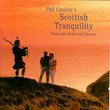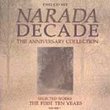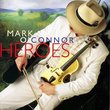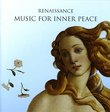| All Artists: Claudio Monteverdi, Rinaldo Alessandrini, Concerto Italiano Title: Monteverdi: Ottavo Libro dei Madrigali, Vol. 2 Members Wishing: 2 Total Copies: 0 Label: Opus 111 Release Date: 10/27/1998 Genre: Classical Styles: Opera & Classical Vocal, Ballets & Dances, Ballets, Historical Periods, Baroque (c.1600-1750), Symphonies Number of Discs: 1 SwapaCD Credits: 1 UPC: 709861301966 |
Search - Claudio Monteverdi, Rinaldo Alessandrini, Concerto Italiano :: Monteverdi: Ottavo Libro dei Madrigali, Vol. 2
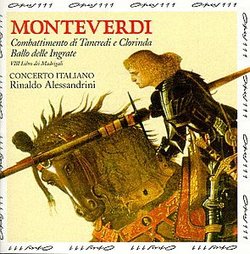 | Claudio Monteverdi, Rinaldo Alessandrini, Concerto Italiano Monteverdi: Ottavo Libro dei Madrigali, Vol. 2 Genre: Classical
Monteverdi's Eighth Book of Madrigals was a milestone, coming late in the then septuagenarian composer's life and offering the fullest flowering of the madrigal form. The two lengthy works collected here fall into the two ... more » |
Larger Image |
CD DetailsSynopsis
Amazon.com essential recording Monteverdi's Eighth Book of Madrigals was a milestone, coming late in the then septuagenarian composer's life and offering the fullest flowering of the madrigal form. The two lengthy works collected here fall into the two chief camps in the Eighth Book, martial and amorous madrigals. The former type is represented by Il Cambattimento di Tancredi e Clorinda, and the latter by Il Balls delle Ingrate. The singing is extraordinary, warm in the lower ranges (of which the lowest is bright and full indeed) and breathtaking in the accelerated trills and quickly tumbling inner machinations of Monteverdi's agitated style. In addition Rinaldo Alessandrini and Concerto Italiano simply couldn't have come up with a broader attack on the pieces, making them sound operatic, symphonic, and intimate at once. This is not only one of 1998's best vocal CDs, it is, when taken with Allesandrini's Book 1 of the Eighth Book, one of the finest looks at Monteverdi in the realm of recorded music. --Andrew Bartlett Similarly Requested CDs
|
CD ReviewsAn essential recording for all true music lovers Sator | Sydney, Australia | 07/29/2005 (5 out of 5 stars) "Monteverdi's setting of the great Humanist poet Tasso's Il Combattimento di Trancredi e Clorinda has been a favorite of mine since I discovered it over ten year ago. If you have yet to discover it for yourself then you are in for something of a real treat. This is a work created in the age of the birth of opera and in original performances the singers wore costumes in a semi-theatrical enactment during the Venetian Carnival. Musically, the style is essentially operatic in its extensive use of homophonic and monodic passages which contrasts markedly to the usually rich polyphonic character of madrigal writing up to this point. Combined with the 'stile concitato' with its musical outlet of violent emotion in passages with much spicey dissonance, this music represents a radical departure from tradition of the sort that Vincenzo Galileo (father of the astronomer) decried in his polemics against Monteverdi's avant garde art. It is here that Monteverdi - along with contemporaries such as Caccini, who fathered opera - hurls music along the route towards a homophonic-triadic musical language that we subsequently take for granted every time we listen to Mozart, Beethoven, Wagner - or for that matter the Beatles.
Tancredi recognizes the figure of a Saracen knight in the darkness and challenges Clorinda to a bloody battle to the death - not realizing it is the legendary Saracen female warrior and their equivalent of Joan of Arc. Tancredi and Clorinda engage in a relentless battle until with both exhausted - the stars fading at the break of dawn - Tancredi plunges his sword into her breast "where immersed, it avidly drinks her blood". She falls dying where she forgives Tancredi and pleads to be baptized (this is Italian music after all!). Tancredi fetches water from a brook only to discover his folly too late, as he loosens Clorinda's visor to discover the face of a woman. With tears of remorse running down his cheeks he baptizes her but tries in vain to revive her with a drink of water only to have her die in his arms. Of course Clorinda expires singing "S'apre il ciel - io vado in pace"(the heavens open - I go in peace). Someone once said that the opera is the only place you can go where you can see someone get stabbed in the back and instead of dying - sing. If ever there were proof that this was in the very nature of opera from its very inception - for this madrigal is written in the newly created musical language of opera - then this has to be it. Nicolaus Hanoncourt also once said that opera could only ever have started in Italy because of the musical character of the language. He suggested listening to an Italian lawyer give the final summary statement in court - the effect he says, is virtually operatic. It is that same mastery of Monteverdi's thoroughly Italian declamatory, rhetorical musical language that the singers of Concerto Italiano utterly relish. After all opera started because of a theory that in Classical Greece plays were sung with minimal accompaniment rather than spoken - it was an attempt to recreate the Classical world whose Humanist idealism shines through brilliantly in Il Combattimento. This release predictably got almost unanimous praise from critics from all around the world. Goldberg early music magazine gave this its highly prestigious five star rating with the comments: "The Italian leader seizes the exasperated urgency of Tasso's poem where everything topples and rapidly flows in an inescapable stream toward the final and tragic rebellion. " The coupled Ballo delle Ingrate is of course almost as fine - the story concerns the fate of ingrateful lovers in hell, to which they are condemned to forever. Concerto Italiano and La Venexiano now virtually have a monopoly on singing madrigals in Italian. Their command of Italian for a start gives them a huge advantage - just as the Royal Shakespeare Company have in performing Shakespeare. These are truly wonderful performances to be recommended to all music lovers. If you are new to pre-Bach music this would a revelatory place to start. Or if you are an opera or vocal music lover who would usually never venture into listening to early music I would still strongly urge you to give this recording a try. In fact even if you were new to Classical music you may find this an eye opener with all its wonderful singing accompanied by the exotic sounds of harpsichord, archlute, theorbo, violins, violas, cello and bass - nearly all of them the most modern instruments for the time. An essential recording if there ever was one." |

 Track Listings (20) - Disc #1
Track Listings (20) - Disc #1

